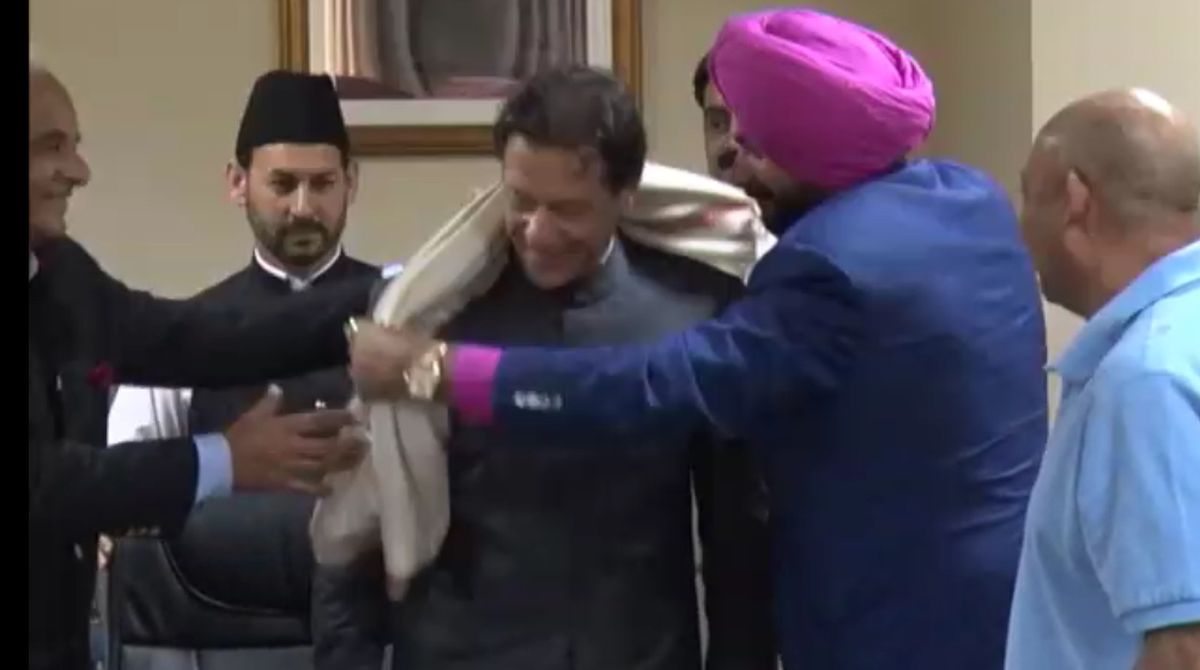Imprisoned Imran Khan writes third letter to Pakistan’s Army Chief
Imran Khan’s legal representative, Faisal Chaudhary, revealed the details of Khan’s third letter while speaking to the media outside the Adiala jail, after meeting with Imran Khan.

Navjot Singh Sidhu with New Pakistani Prime Minister Imran Khan (Photo: SNS)
Most dictionaries define a “hug” as a gesture of affection. In the Indian political lexicon, however, that gesture has a variety of hidden complications. So much so that to hug or not to hug becomes the million-dollar question that is never easy to answer satisfactorily ~ or at least to the satisfaction of rival political entities. Could it be because our politicians are essentially cold and calculating, not given to gestures, unless certain that benefits would accrue? For the risk of triggering a negative reaction often outweighs the gains a warm gesture could generate. Navjot Singh Sidhu has learnt this the hard way.
His hugging the Pakistan Army Chief during the festivity associated with the oath-taking of cricketer-turned-prime minister Imran Khan in Islamabad threatens to erode all the mutual goodwill conveyed in the invitation from Imran and Sidhu’s acceptance of it. Not surprisingly the affection-devoid loudmouths of the Bharatiya Janata Party have been in the forefront of the attack.
Advertisement
Had the government been so bitterly opposed to an Indian presence at the festivity it could have signalled disapproval: so was it envy that no BJP cricketer (Chetan Chauhan or Kirti Azad for example) was included in the list of invitees? And could, within a split-second of Gen Qamar Bajwa suggesting the re-opening of a road-route to a Sikh shrine, Sidhu have been expected to recall a military hostility that has persisted some 70 years and shun the overture? Only his former party’s indoctrination could have alerted Sidhu to the potential fall-out of being “human”.
Advertisement
Not that every BJP stalwart is constantly on guard. Not too long ago the Prime Minister was caught napping in the Lok Sabha. After mounting a scathing assault on the BJP’s divisive policies, Rahul Gandhi crossed the floor and surprised Mr Narendra Modi with a hug, which the latter had little option but to smilingly accept (like Sidhu?). Of course Rahul’s insincerity was quickly established courtesy his schoolboy-like wink when the TV camera focused on him. The BJP reaction was ballistic. The Speaker indicated unhappiness but stopped short of dubbing Rahul’s “getting physical” as unparliamentary: one party loudmouth later said he was afraid of being close to Rahul, lest he too was hugged and sexual preferences were called into question. Hugs, quite clearly, are not part of Indian politicians’ “vocabulary”.
Thoughts must flash back to another notorious hug some 28 years ago when then foreign minister Inder Gujral kicked up an international storm when he hugged the much-despised Saddam Hussein after the Iraqi “annexation” of Kuwait. What was forgotten was that the gesture facilitated the evacuation of thousands of Indian workers who would otherwise have been “trapped” when “Stormin Norman” unleashed the Desert Storm that triggered shock and awe across the region. Unlike Sidhu’s or Rahul’s, Gujral’s gesture paid dividends. Time for second thoughts about gestures of affection?
Advertisement